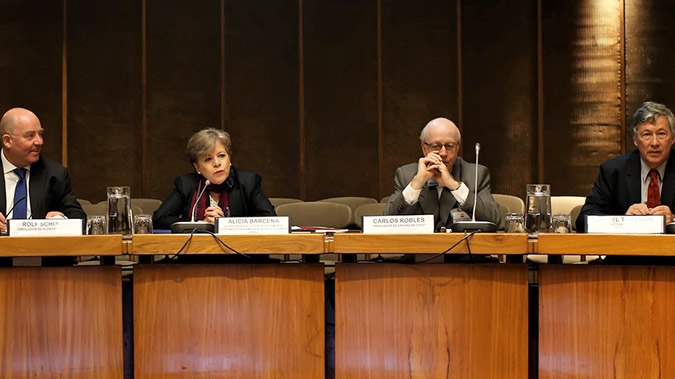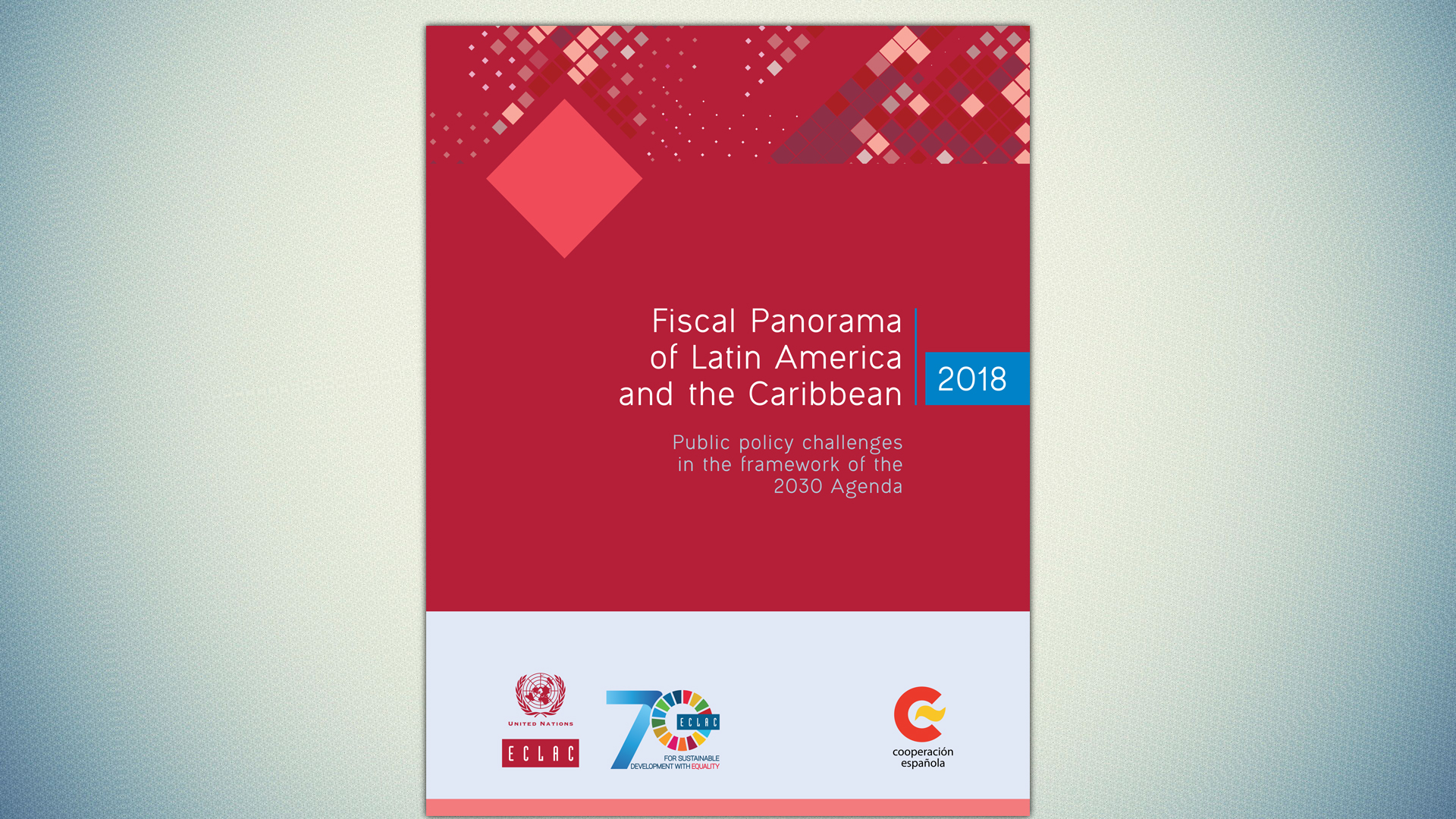Fiscal Policy is a Fundamental Instrument for Achieving the 2030 Agenda and Inclusive, More Equitable Growth
Work area(s)
Authorities from various countries and international experts meet at ECLAC for the 30th Regional Seminar on Fiscal Policy.

Authorities from various countries and distinguished international experts kicked off the 30th Regional Seminar on Fiscal Policy, pointing out that fiscal policy is a fundamental instrument for achieving inclusive and more equitable economic growth, and thus meeting the 2030 Agenda and its Sustainable Development Goals (SDGs).
The event, which has become a milestone for discussing current economic and fiscal issues in the region, is celebrating its 30th anniversary this year. It is organized by the Economic Commission for Latin America and the Caribbean (ECLAC) with support from the International Monetary Fund (IMF), the World Bank (WB), the Inter-American Development Bank (IDB) and the Organization for Economic Co-operation and Development (OECD). Participants include ministers and deputy ministers of Finance and Economy from various countries.
The seminar was inaugurated by Alicia Bárcena, ECLAC’s Executive Secretary; Rolf Peter Schulze, Ambassador of the German Federal Republic in Chile; and Carlos Robles Fraga, Spain’s Ambassador to Chile.
In her opening remarks, Alicia Bárcena pointed out that in 2017, the dynamics of public finances for the region were characterized by fiscal consolidation, which, combined with the uptick in economic activity, mitigated the growth of regional public debt. However, she warned that several countries also registered a concerning decrease in capital spending.
“It is important to underscore that the reduction in public investment experienced in recent years will have an impact beyond the short term and will limit potential growth in the region even more. This reaffirms the importance of adopting measures of protection for these expenditures to ensure they are not used as the main instrument of adjustment,” the United Nations senior official stressed.
Bárcena added that, after the approval of the 2030 Agenda for Sustainable Development in 2015, the issue of development financing has taken on a central role, with the mobilization of internal resources standing out among alternative sources. On this point, she indicated that for most of these countries, the level of resources is below potential, not only due to flaws in tax design and administration, but also, and mainly, to the high levels of tax evasion, in both the domestic and the international spheres, and because of substantial tax expenditures.
Therefore, “broadening the tax base and improving the design of the tax system, strengthening tax administration and eliminating channels of tax avoidance and evasion are key tasks for improving the financing of sustainable development and inclusive growth in the countries of the region,” stated Bárcena.
Ambassador Rolf Peter Schulze said in his remarks that international cooperation is a fundamental pillar for the implementation of the 2030 Agenda in the countries of Latin America and the Caribbean. To this end, the countries of Europe have made efforts to complement their programs in this area by working with international organizations like ECLAC.
“This seminar seeks to identify possibilities for increasing internal revenue without suffocating necessary economic growth. This will allow us to follow a path toward inclusive development in the countries of Latin America and the Caribbean and to identify the challenges posed by the 2030 Agenda when it comes to public spending; in other words, budgets,” said Ambassador Schulze.
Ambassador Carlos Robles Fraga, in turn, emphasized the importance of identifying fiscal policy objectives, which can range from economic growth to inequality, to monetary and financial stability, among others. “First and foremost among these must be the sustainability of the State, in order for it to fulfill its function,” he underscored.
“We are aware of the existing challenges in Latin America. We understand that fiscal reforms are necessary in order to carry out public policies that facilitate social cohesion. Without social cohesion, there is no political stability,” emphasized the Spanish diplomatic representative.
During the first day of the 30th Regional Seminar on Fiscal Policy, ECLAC’s Executive Secretary will present the Fiscal Panorama of Latin America and the Caribbean 2018, produced by this organization, which analyzes current fiscal trends for the region and examines the historic evolution of fiscal policy over the last three decades as well as future challenges.
The report calls for strengthening the role of fiscal policy as a stabilizing instrument and driver of growth, in addition to reinforcing the social protection and personal income tax systems, since this will result in a double benefit by improving fiscal policy’s stabilizing role and its redistributive impact.
There will also be a panel of senior authorities, including Francisco Moreno Guzmán, Chile’s Deputy Secretary of Finance; Lea Giménez Duarte, Paraguay’s Minister of Finance; Donald Guerrero Ortiz, the Dominican Republic’s Minister of Finance; Danilo Astori, Uruguay’s Minister of Economy and Finances; Martha Cubillo Jiménez, Costa Rica’s Deputy Minister of Expenditures and National Treasurer; and Ana Paula Vescovi, Brazil’s National Treasury Secretary.
Tomorrow, March 27, the report Revenue Statistics in Latin America and the Caribbean (2018) will be presented during the seminar. This publication was produced by ECLAC along with the OECD, the IDB and the Inter-American Center of Tax Administrations (CIAT).
Related content
Inauguración de la Trigésima versión del Seminario Regional de Política Fiscal
Palabras de Alicia Bárcena, Secretaria Ejecutiva de la CEPAL.

XXX Seminario Regional de Política Fiscal
El XXX Seminario Regional de Política Fiscal es organizado por la Secretaría Ejecutiva de la Comisión Económica para América Latina y el Caribe (CEPAL) con el apoyo del Fondo Monetario Internacional …

ECLAC Calls for Strengthening Fiscal Policy’s Role as Instrument of Stabilization and Driver of Economic Growth
In its annual publication “Fiscal Panorama of Latin America 2018”, the organization analyzes fiscal policy in the region over the last three decades and the implementation challenges of the 2030…

XXX Seminario Regional de Política Fiscal
El XXX Seminario Regional de Política Fiscal es organizado por la Secretaría Ejecutiva de la Comisión Económica para América Latina y el Caribe (CEPAL) con el apoyo del Fondo Monetario Internacional …
Country(ies)
- Latin America and the Caribbean
Related project(s)
Contact
Public Information Unit
- prensa@cepal.org
- (56 2) 2210 2040
